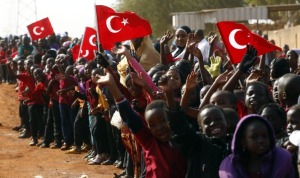
Ankara’s latest achievement took place in late November 2014 at the second Turkish-African summit in which Turkey has emerged as a partner of the whole continent. The parties approved the Joint Action Plan for the period until 2019 and confirmed the development of their relationship reaching the level of strategic partnership.
Turkey’s success in Africa is indeed impressive. While the focus of the international community is on Turkish foreign policy in the Middle East, Ankara “has moved deep into” the African continent in all directions, increasing communication in politics, economics, and the socio-cultural sphere.
Turkey is rapidly expanding its diplomatic presence in the African continent. Over the past five years 27 new Turkish embassies have appeared in African countries (thus, their total number there has increased to 39). In turn, the number of African diplomatic missions in Ankara has increased from 16 to 30. The exchange of visits at the highest and high levels has intensified.
Over the ten last years Turkey’s trade volume with African countries increased from 5.5 to 20 billion dollars. Turkish investments in Africa reached 6 billion dollars. Dozens of international agreements on trade and economic cooperation and the creation of business councils have been signed. Flight connections between Turkey and Africa have been developing at record speed. Currently, the “Turkish Airlines” company has 46 direct flights to various cities in 28 countries in Africa.
Also, the humanitarian component of relations with the African continent has not escaped Ankara’s attention. The Turkish International Cooperation Agency (TICA) has opened representative offices in 11 countries in Africa to provide grant aid to the poorest countries. Hundreds of African students have either already received higher education or continue to study in Turkey at the expense of the host country.
All this allows the Turkish leadership to consider Africa a successful and promising direction for its foreign policy.
At the same time, some “pitfalls” of Turkish-African relations have emerged recently, suggesting that the “conquest” of Africa is not an easy task even for all the Turkish passion and political will.
Potentially, the “weakest link” in Turkish-African affairs is the fact that the “locomotive” of cooperation is politics, not economics. Turkish businessmen are afraid of difficulties, costs and risks of business organization in underdeveloped African countries. In this regard, the Turkish leadership is forced to stimulate the activity of Turkish companies in Africa, overseeing the organization of special programs for the development of relations between Turkish and African businesses.
There are questions regarding the fate of Turkish schools, many of which have been opened in African countries by entrepreneurs from the Fethullah Gülen community – the founder of the influential “Cemaat” in Turkey and the network of educational institutions around the world. Private Turkish schools in Africa are designed not so much for the Turkish diaspora, as for the local residents, and perform the task of Turkey’s “cultural penetration” of the African continent. Currently, 34 countries in Africa opened 60 Turkish schools the activity of which meets Ankara’s strategic interests.
However, a sharp conflict accompanied by the persecution of the “Cemaat” schools in Turkey has broken out between the Turkish government and Fethullah Gülen, a resident of the US. In this situation, Ankara is faced with a difficult choice: to solve the difficult task of either taking over Gülen’s “school empire” in Africa or leaving a powerful “cultural weapon” in the hands of its ideological opponent.
An unpleasant event awaited Turkey in October 2014. Despite all the achievements of its “African policy”, Ankara had failed to enlist Africa’s support in its struggle for a seat as a non-permanent member of the UN Security Council for the period 2015 – 2016. Yet it was precisely the voice of the overwhelming majority of African states that had voted for Turkey’s candidacy, which was the crucial factor that allowed Ankara to join the UN Security Council in 2009. Even Ankara’s attempts to act as the “voice of Africa” at international forums (including the United Nations and the G-20) and to promote the “African solutions proposed by Africans themselves” did not help.
Turkey’s failure is associated with the frustration of a number of African countries, which was attributed to Ankara’s policy on Syria. We are talking about Turkey’s support of the armed opposition to the incumbent president B. Assad, which is seen by many as direct interference in the internal affairs of the region.
Turkey is an active participant in the “Battle for the African continent”, which has begun to unfold amid expectations of the upcoming growing importance of this “periphery” of the modern world. The officials in Turkey even call it an “Afro-Eurasian country”. Ankara claims to have four levels of cooperation with Africa: bilateral, regional, continental and global. However, it is clear that regional and global factors are also able to intervene in the developing Turkish-African relations, presenting Ankara with challenging dilemmas.
Irina Svistunova, a Senior Fellow at the Center for Asia and the Middle East, the Russian Institute of Strategic Studies, exclusively for the online magazine “New Eastern Outlook”
